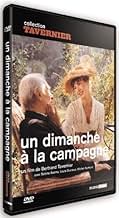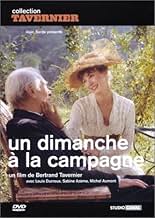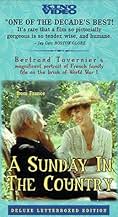IMDb-BEWERTUNG
7,4/10
3375
IHRE BEWERTUNG
Ladmiral erkennt in seiner Tochter Irene, den Menschen welcher er gern geworden wäre.Ladmiral erkennt in seiner Tochter Irene, den Menschen welcher er gern geworden wäre.Ladmiral erkennt in seiner Tochter Irene, den Menschen welcher er gern geworden wäre.
- Regie
- Drehbuch
- Hauptbesetzung
- Nominiert für 1 BAFTA Award
- 13 Gewinne & 12 Nominierungen insgesamt
Sabine Azéma
- Irène
- (as Sabine Azema)
Geneviève Mnich
- Marie-Thérèse
- (as Genevieve Mnich)
Empfohlene Bewertungen
Not much happens during "A Sunday in the Country", which depicts what the title suggests: a well-to-do French family having a Sunday gathering during what appears to be the 1920s - it is the world of Marcel Proust, only a few decades later. This presents more of a family portrait and character revelation piece than a plotted story. We get to know the main characters and their relationships - the genteel old father dotes on his exciting daughter and is critical of his dour, proper son. He is dependent on the crabby housekeeper who rules the home. It is a mellow, fine-looking film, sprinkled with comments on impending death and art. Sabine Azema steals the show as the charming but flaky Irene.
Bernard Tavernier manages to turn the very simple plot of a son and a daughter visiting their aging painter-father in the countryside into a series of poetic reflections on life and art, youth and old age, the city and the country, potential and (partial) fulfilment. With the help of absolutely wonderful shots in pastel colours (achieved by means of skipping the 'bleaching' phase in the processing of the film) and very unobtrusive commentary Tavernier takes his viewers on a one day tour of the musings of a 70 year old impressionist painter who is looking back on his life and work. Many of the shots will remind an attentive audience of the paintings by Monet, Renoir and others, even if Tavernier argues they were largely inspired by the first colour pictures of the Lumière brothers.
The US release of this magnificent film has English subtitles. Even though one cannot blame the subtitlers for concentrating on essentials they have in my opinion needlessly erred on the side of sparsity.
The US release of this magnificent film has English subtitles. Even though one cannot blame the subtitlers for concentrating on essentials they have in my opinion needlessly erred on the side of sparsity.
In early 20th century France, an impressionist painter is visited at his country estate by his grown children. This is a very low-key film where nothing much happens but where one experiences the satisfaction of having spent a Sunday afternoon in the country engaged in conversation with intelligent people. Ducreux is excellent as the patriarch nearing the end of his life who relishes the visit from his dutiful son and free-spirited daughter, but is overcome with feelings of nostalgia and perhaps regret. The cinematography is gorgeous, with images suggesting impressionist paintings. The soundtrack appropriately consists of chamber music, that of Faure.
I think this film can be appreciated on several levels. For some viewers, this is just a happy family portrait, reflecting a more peaceful time and recalling one's own memories of family outings and quiet Sunday afternoons. I think this point of view is mistaken, but I can see why people feel this way. The film is externally slow- moving and peaceful, like a sunny river. But like a river, there are strong currents lurking, invisible, under the surface -- currents that cannot be seen, but only observed indirectly from their effects.
There's a lot more going on here than just ninety minutes of bucolic peacefulness. Pay attention to the details, the small looks and gestures, the things said and things left unsaid. You can almost see the fine strands that link the characters, like a spiderweb, where each character's movements are felt by all the others. The role of the narrator, often disparaged in film, is used effectively here, giving the film a somewhat novel-like quality and reminding the viewer of their presence as an observer.
There's more to be said about this film, but I don't feel quite up to it. In any case, the real meaning of the film can't easily be described in words -- which is a good thing, or the film would be unnecessary. So watch the film yourself, if you haven't already, and see what you think.
There's a lot more going on here than just ninety minutes of bucolic peacefulness. Pay attention to the details, the small looks and gestures, the things said and things left unsaid. You can almost see the fine strands that link the characters, like a spiderweb, where each character's movements are felt by all the others. The role of the narrator, often disparaged in film, is used effectively here, giving the film a somewhat novel-like quality and reminding the viewer of their presence as an observer.
There's more to be said about this film, but I don't feel quite up to it. In any case, the real meaning of the film can't easily be described in words -- which is a good thing, or the film would be unnecessary. So watch the film yourself, if you haven't already, and see what you think.
I saw this film sixteen years ago, at a time when I did not see many 'filmhouse' movies yet. It made a strong impression on me, I wasn't used to so many 'open spaces' in films, which spectators have to fill according to their own ideas. Later I understood that once you start filling these 'holes' with pieces of yourself, the film becomes much more personal.
From time to time I think back to this film, like I did just now when I looked it up in the IMDB. Its storytelling, or rather story-hinting, is apparently so strong that even after sixteen years I am looking for some answers to the questions that the film raises.
In short: go see it.
From time to time I think back to this film, like I did just now when I looked it up in the IMDB. Its storytelling, or rather story-hinting, is apparently so strong that even after sixteen years I am looking for some answers to the questions that the film raises.
In short: go see it.
Wusstest du schon
- WissenswertesThe film is included on Roger Ebert's "Great Movies" list.
- PatzerIrene's flower in her bodice disappears and then reappears.
- SoundtracksQuintette pour piano et cordes Op. 115
Written by Gabriel Fauré
Performed by Le quatuor Via Nova, Jean Hubeau piano solo
Top-Auswahl
Melde dich zum Bewerten an und greife auf die Watchlist für personalisierte Empfehlungen zu.
- How long is A Sunday in the Country?Powered by Alexa
Details
- Erscheinungsdatum
- Herkunftsland
- Sprache
- Auch bekannt als
- A Sunday in the Country
- Drehorte
- Château du Grand Saint-Léger, Villers-en Arthies, Val-d'Oise, Frankreich(house and garden)
- Produktionsfirmen
- Weitere beteiligte Unternehmen bei IMDbPro anzeigen
Box Office
- Bruttoertrag in den USA und Kanada
- 2.411.143 $
- Weltweiter Bruttoertrag
- 2.411.143 $
- Laufzeit
- 1 Std. 30 Min.(90 min)
- Sound-Mix
- Seitenverhältnis
- 1.66 : 1
Zu dieser Seite beitragen
Bearbeitung vorschlagen oder fehlenden Inhalt hinzufügen


























